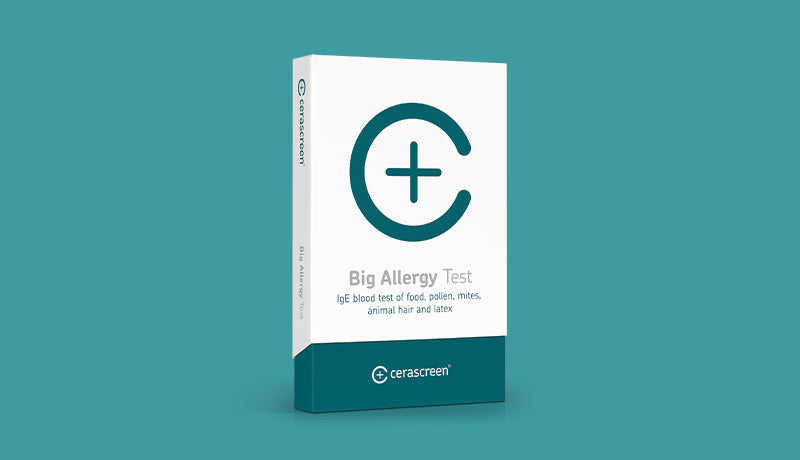Why test for common allergies?
Allergies are widespread and have become more and more common over the past few decades. The most common are allergies to pollen, animal hair and dust mites. But other triggers, such as food, also play a role – and these allergies are often difficult to recognise in day-to-day life.
If you have allergic symptoms and cannot determine the cause, an IgE test can be of great help. With our Big Allergy Test, you can cover a range of possible triggers and investigate allergies you might not have thought or heard of. You can also screen for cross-reactions – these cross-reactions often cause people to react to other substances, usually foods, because of their allergy.
Who should take the Comprehensive Allergy Test?
IgE allergy testing can be useful for anyone who suffers from allergy symptoms and has not yet found the exact cause of their symptoms.
Many people think that if they did not develop allergies as a child, they will not develop them as an adult. This is not the case. It is true that many allergies develop in childhood, but in some cases, adults can develop allergies too.
How does the IgE blood test work?
To do the IgE allergy test, you take a small sample of blood from your fingertip with a lancet. You only need a few drops of blood. Place the drops on two dried blood spot cards – this way, you only have to take a very small amount of blood, and the sample can be stored for a long time.
The sample is sent free of charge to our specialised medical laboratory in a return envelope. The laboratory analyses the number of IgE antibodies against 61 different allergens. After the lab analysis, you will receive a notification telling you to access your results report via your online account or the My cerascreen® app.
Please note that the most meaningful results will only be obtained if you have had regular contact with the allergen in the two weeks or so prior to sampling. Some medications, for example antihistamines, can also influence the result.
How long does the analysis take in the laboratory?
Once your sample has arrived at the laboratory, it will be analyzed there by specialists. How long the analysis takes depends on the exact measuring method and the processes in the laboratory.
If the sample is sent on the correct days (Sunday to Tuesday), this makes it easier for the laboratory to adhere to the times.
For the Comprehensive Allergy Test, the laboratory analysis is usually completed within 5 working days after the sample is received in the laboratory.
What will the results tell me?
The Comprehensive Allergy Test results report tells you which allergens are responsible for the highest amounts of IgE antibodies in your blood. You will find out how strongly you reacted to these allergens, if at all.
A table in the report shows how sensitised you are to the 61 allergens tested. This sensitisation represents the likelihood of your immune system having an allergic reaction to various triggers. This – together with existing symptoms – is an indication that you have an allergy.
The report also lets you know if you have any cross-allergies, which occur when your body reacts to allergens with a similar protein structure.
Which recommendations will I receive after the test?
Elevated IgE levels are a sign of allergy but are not an official diagnosis. High IgE values are not always accompanied by symptoms and sometimes do not cause any health problems. You can use the results from the Big Allergy Test as an initial indication to allow you to then look more closely at your symptoms and how these could be linked with triggers in your daily life.
A reliable allergy diagnosis can only be made by doctors who, in addition to the test results, will take into account the history of your symptoms. As a rule, you will also receive further recommendations for action from them.
In addition, you will receive information about possible cross-allergies, which often develop between pollen and food or between house dust and shellfish, for example.
The results report also gives you advice on how to optimise your gut health. Healthy gut flora can possibly help prevent allergies and perhaps even reduce the impact of allergic reactions in those affected.
Which allergens are analysed?
The cerascreen® Comprehensive Allergy Test measures the concentration of IgE antibodies against 61 different allergens.
Pollen: Ragweed, mugwort, ribbed grass, glasswort, prickly pear, alder, birch, hazelnut, olive, poplar, cypress, dogtooth grass, bahia, grass mix, timothy grass, rye
Animal hair: mite mix, cat, horse, dog, cockroach mix
Vegetables: tomato, carrot, celery, garlic, onion, green bean, potato
Fruit: banana, orange, strawberry, apple, peach, kiwi, pineapple, mango
Animal products: egg white, milk, cod, salmon, tuna, shrimp, beef, lamb, chicken
Cereals: wheat, barley, oats, corn, rice
Nuts, seeds and legumes: hazelnut, almond, peanut, sesame, soya
Others: mustard, ginger, latex, Cladosporium herbarum
What are IgE antibodies?
If you have an allergy, your body’s defence is disrupted. Specific immunoglobulin E (IgE), your immune system’s antibodies, play a central role in allergic reactions.
During an allergic reaction, your immune system produces too many of these specific IgE antibodies in your body. When they encounter harmless proteins found, for example, in food, animal hair, pollen and dust mites, they stop your immune system from functioning normally. As a result, mast cells, a type of immune cell, release a messenger substance called histamine. Histamine then causes inflammation, which, in turn, leads to typical allergy symptoms.
What symptoms do you have if you have an allergy?
The most common allergies, for which we screen in this IgE allergy test, are allergies where symptoms appear immediately or shortly after contact with the respective allergens.
Typical allergy symptoms are:
- Asthma, coughing and breathing difficulties
- Rhinitis, sneezing and inflamed nose
- Itching and burning of the eyes
- Skin rashes
- Swelling of the eyes, mouth or throat
- Gastrointestinal problems such as diarrhoea and constipation
What consequences can an allergy have?
Allergies are naturally unpleasant. Some, like pollen allergies, recur every year and are difficult to avoid. Others, such as food allergies, restrict many people in terms of what they can eat, while dust mite allergies mean that people have to rearrange their homes.
In addition, untreated allergies can be accompanied by a number of secondary symptoms. This is particularly the case for allergies, such as pollen, pets and dust mites. They can increase the risk of long-term allergic asthma if you are constantly exposed to allergens. If your mucous membranes are constantly irritated, your risk of developing sinusitis also increases.
What are cross-allergies?
With an allergy, your immune system reacts to allergens, which are certain proteins present in food, pollen, animal dander, etc. These allergens are sometimes very similar in their chemical structure, which can trigger a cross-reaction. This is where your body reacts to certain substances because you are allergic to other substances.
Cross-reactions between pollen allergy and certain types of fruit, vegetables and nuts are the most common. People who are allergic to birch pollen exhibit allergy symptoms when they eat fruit, often apples, for example. Typical symptoms are a tingling sensation in your mouth, itching or burning in the mouth area or facial swelling.
Why are children under 18 not allowed to take the test?
Our tests are not suitable for underage children and adolescents under the age of 18. Under 18s cannot activate the tests online and therefore cannot receive a test result. We ask that you do not administer the tests to your children either.
Children and adolescents need much closer supervision and counselling regarding medical tests and their interpretation. Testing with lancets and chemicals is not without risk and would need to be closely supervised by guardians. In addition, the reference values we give are always based on adult data. In the case of children, the risk of misinterpreting the results would be very high.
We want to fulfil our responsibility as a provider of medical products and ensure that children and adolescents are not unsettled by measurement results that are difficult for them to interpret. Since we cannot control whether the minors' legal guardians actually consent to the test being carried out and supervise them, we exclude tests for under 18s altogether.
If you are under 18 and have purchased a test, please contact our customer support.
Why does it take up to a week for the sample to reach the lab?
Please bear in mind that your results will not be analyzed in the UK but in Germany. For that reason, it can take up to a week for the sample to arrive at the lab. This does not affect the stability of the samples, as the method we are using is optimized for long transports.
Initially, your sample is sent to our collection center in the UK. From there, it is shipped to our central sample sorting facility in Germany, which then distributes samples to our partner laboratories. Once your sample is analyzed there, you will receive a notification and can access your result online.
Please check your mailbox regularly. We will notify you as soon as your sample is sent, arrives, or is analyzed.
Why does the test have an expiration date?
The cerascreen® test kits are CE-marked medical devices, which in turn include other certified medical components such as lancets, patches, and alcohol swabs used in blood tests.
Like most medical devices, these components have an expiration date to ensure that they remain safe and effective. Many of our sample carriers – such as dried blood cards or sample tubes – are chemically treated to keep your sample stable and analyzable in our laboratory. Over time, environmental factors can affect this treatment and compromise accuracy.
Our sterile, single-use lancets also carry an expiration date to guarantee sterility and safe use up to that time.











